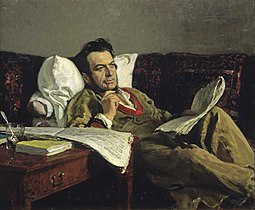
A regular feature of Concertzender is Emanuel Overbeeke’s choice of the composer of the month. Nobody knows exactly how long he has been doing this or felt like looking it up. And what does it matter anyway; content is what it should be all about. It’s time for a conversation about autonomy, biography and how to select composers.
Emanuel, how do you go about selecting your CotM?
I have several criteria: sometimes a special occasion (birthday, year of death, event), but I also look if the composer in question has already been heard, if there are enough interesting recordings available (several broadcasts will have to be filled, by others as well), and, of course, personal preference. I do try to conceal the latter somewhat. They must be good enough; quality is more important to me than style.
How do you feel about the relationship between music and a composer’s life?
Someone’s life doesn’t define their work, but it can make certain creative choices understandable. If someone wants to interpret a work as purely biographical, or if an artist wants to be primarily biographical, I would say: write an autobiography or a song about private matters. The best art transcends the circumstances under which it is created. I personally don’t judge by recognisability. With a lot of art, we don’t know what the creator intended or where and how it was made, but we do know if it makes us feel a certain way. My favourite artists always give non-conforming answers that captivate, even if you don’t know the context and customs. Biography and context are often crucial to contemporaries, but the better an artist and the greater the difference in time, the more attention the personality gets. For example: in 50 years, few people will know who Richard Nixon was, but more people will know Nixon in China. Simon Boccanegra was also a historical figure. Of course, this rule doesn’t always apply.
Is music autonomous? Or is it a historical phenomenon, bound by place and time?
With a lot of art, we don’t know what the creator intended or where and how it was made, but we do know if it makes us feel a certain way. Aesthetics is not an afterthought but the essence. And even if we do know what the creator wanted, aesthetics are still vital. Good art has character, and therefore an implicit message. A message like that is often stronger than an explicit one. Art is not the embodiment of a message, it’s art, and that’s what gives it strength. The better the aesthetics, the more impact art has. If the message is clear but the aesthetics are not compelling, I’ll be cringing while listening. At best, art is, implicitly a pamphlet.
Are there any performers you keep coming back to?
Oh yes. If I were to mention names, it would take a while. But, if I were to skim them all over and cut a lot of corners, I would go for the structure-oriented powerhouses. I love historical recordings, first of all, because some of them are insanely good, but also because they put current ideas about performance practice into perspective or make you appreciate them more. In the long run, this also puts quality over style. The better the performer, the faster and more effortlessly they work.
We have muddled along to 2021: is there a composer of the century in sight?
The composer of the century is mainly a PR-term. Besides, we’ve got a couple more years to go. But we can’t rule it out. There are some excellent composers nowadays, like Benjamin, Saariaho, and Reich. Still, I don’t think any one of them can live up to the composers of the 20th century (Stravinsky, closely followed by Debussy and Boulez) and the 19th century (Beethoven and Wagner, photo finish) in terms of revolutionary content, quality, and relevance. If such a person emerged, they would be operating in entirely different social and cultural circumstances than their predecessors. For that matter: the trouble a lot of people have with modern-day music arises, I think, because many people listen to it out of pre-modern culture. Fortunately, in recent decades, an audience that listens to modern music with a modern cultural look has formed. Perhaps this can enhance the appreciation of new music. In answering the question, I would certainly not pay attention to the very many current irrelevant composers because that high percentage is of all times. The difference is that the past’s lesser gods have been rightfully forgotten, and those of our time haven’t yet. I find Richter and Cannabich just as dull as bad electronic music, and Berio and Carter just as fascinating as Mozart and Ravel. Besides, even composers who may not receive this title of composer of the century may be very good, like Bartók, Janacek, Webern, Otto Ketting and Louis Andriessen.
Go with Glinka
Composer of the Month: weekdays from 16 to 17 hrs.








